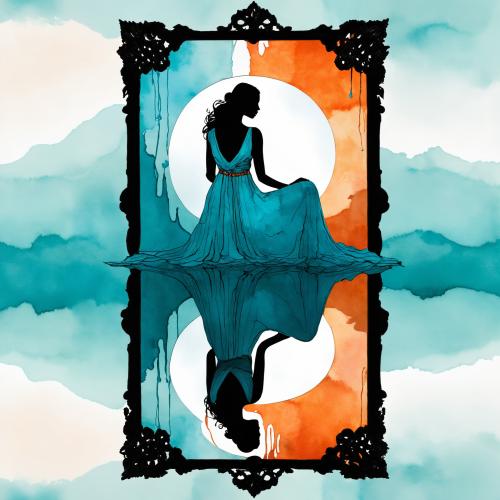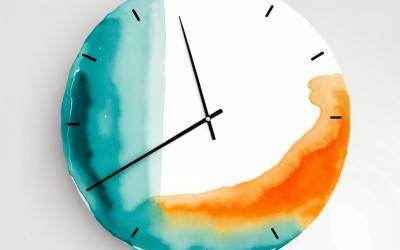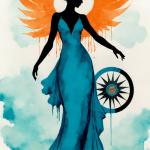Tarot is shrouded in mystery and misconceptions. From fortune-telling myths to rigid rules, many misunderstandings surround the practice. Today, let's clear up some of the most common myths about tarot and shed light on its true nature...
Myth 1: Tarot is Only for Fortune-Telling
Contrary to popular belief, tarot is not just about predicting the future. It's a powerful tool for introspection, guidance, and personal growth. Tarot helps you explore your inner world and gain insights into your current situation. Imagine you're at a crossroads, unsure whether to order a pizza or cook a healthy meal. The tarot might not tell you which toppings to choose, but it can help you reflect on why you’re craving that greasy slice in the first place. If you wish to explore this topic further, check out the article 'The Present is a Gift: Why I Don't Use Tarot to Predict the Future'
Myth 2: You Need to Be Psychic to Read Tarot
You don't need to be psychic to read the Tarot. In fact I expressly state at the beginning of all my readings with new clients that I'm not psychic. Why? Because I want to be as authentic as possible in my readings - I don't want to start with a lie before we've even begun. Additionally, my client might ask me a question that I'm either not comfortable, or not capable of giving. As far as I'm concerned, I'm not here to pluck the answers out of the ether, or have spirits whisper them in my ear. I'm here to help facilitate the understanding within my client that they were in posession of the answers all along.
Tarot reading is about understanding the symbolism of the cards and connecting with your intuition. With practice and study, anyone can learn to read tarot. Think of it like learning to ride a bike – you don’t need to be a Tour de France champion to enjoy a leisurely ride through the park. Just hop on, pedal, and enjoy the journey.
Myth 3: Tarot is Evil or Occult
Many people associate tarot with dark magic or the occult, but this couldn't be further from the truth. Tarot is a neutral tool, and its use depends on the reader's intentions. It can be a positive force for self-reflection and personal development. It’s like a kitchen knife – you can use it to make a delicious meal or, you could get a little stabby with it. The knife plays no part in the decision making process, that's all on you.
Myth 4: You Must Follow Strict Rules to Read Tarot
There are no rigid rules for reading tarot. While traditional spreads and interpretations exist, personal intuition plays a significant role. Feel free to adapt and create your own reading style that resonates with you and the questions you want to ask. Rules in tarot are like guidelines for assembling IKEA furniture – you can follow them to the letter, or you can end up with a unique, albeit wobbly and loveable, creation that’s distinctly yours.
Myth 5: Tarot Cards Have Fixed Meanings
The meanings of tarot cards vary based on their position within the spread, the question asked, and the reader's intuition. Each reading is unique, and the cards' interpretations can change depending on the situation. Think of it like reading a novel – the themes, messages and what it means to you can change depending on your mood, life experiences, and whether or not you've had your morning coffee.
Myth 6: You Shouldn't Buy Your Own Tarot Deck
It's a common belief that someone else must gift you your first tarot deck, but this isn't true. Buying your own deck can be a personal and empowering choice. Choose a deck that resonates with you and your journey. It’s like picking out a pair of shoes – you wouldn't want someone else choosing a pair that doesn't fit your style or pinch your toes, right?
If this is one that you really can't get over, at the very least, coordinate with a friend and buy each other the decks you want!
Myth 7: Tarot Can Tell You Exactly What Will Happen
Tarot provides guidance and insights, not exact predictions. It helps you explore possibilities and make informed decisions, but it doesn't dictate a fixed future. The future is shaped by your choices and actions. Think of tarot as your GPS – it can show you the route and suggest detours, but ultimately, you’re the one behind the wheel.
Myth 8: You Shouldn't Allow Someone Else to Touch Your Tarot Deck
Some believe that letting others touch your deck will interfere with its energy. I guess this one depends a lot on your beliefs surrounding energy, and whether inanimate objects can be affected by it. My personal view is that I see my deck and I as a team, and I have the utmost confidence that my teammate will help me unearth the answers needed in a given reading. The second that I doubt my teammate, is the moment that I doubt myself and my authority and ability to help the person sat opposite me goes out of the window. Am I going to lose the plot or give a bad reading because someone touched some bits of cardboard? No.
With that said, if people do want to look at my cards (and why wouldn't they, they're beautiful!), I think it's only respectful to ask first. Not for energetic reasons, but in the same way that I think it's respectful to ask any professional if you can touch their tools of the trade. It's their livelihood, and as such, they probably treat those tools with as much care as they would treat their own children.
Myth 9: You Have to Memorize All Card Meanings
This one was a big one for me to get over initially - it took me a while to realise that it wasn't the meanings of the cards as they were given in the book that was important, but how I was able to link the cards together to form a story and generate meaning. Sure, it helps to know the basic meanings, but you'll go much further by trusting your intuition and personal interpretation. Tarot is as much about connecting with your inner wisdom as it is about knowing the traditional meanings. It's like learning to dance – knowing the steps is useful, but feeling the music and moving intuitively is what makes it truly magical.
Myth 10: Tarot is Against Religion
This, like the myth about the occult, has, I suspect, sprung up from religious people trying to comprehend what they cannot understand. How can a set of cards 'know' you, when their teachings tell them that only God can truly know you? It must be the Devil, working through these bits of cardboard! Who's to say that it's not just as likely that it's God? Again, I think it really comes down to your intention - if you intend to really know yourself on a deep level, or authentically help the person sitting opposite you in a reading, then the cards are the most beautiful set of tools that we could be provided for this process. If, on the other hand, you are closed minded, and aren't open to new perspectives and wisdom that the cards may be trying to tell you, then ultimately, you're going to have a bad time.
Understanding and debunking these myths can help you approach tarot with greater confidence and clarity. Whether you're new to tarot or a seasoned reader, remember that tarot is a versatile and personal tool. Use it to explore your inner world, gain insights, and empower yourself on your journey. And always remember, as Eckhart Tolle would remind us with a twinkle in his eye, “Life is the dancer, and you are the dance.” Enjoy the rhythm of your tarot journey!






